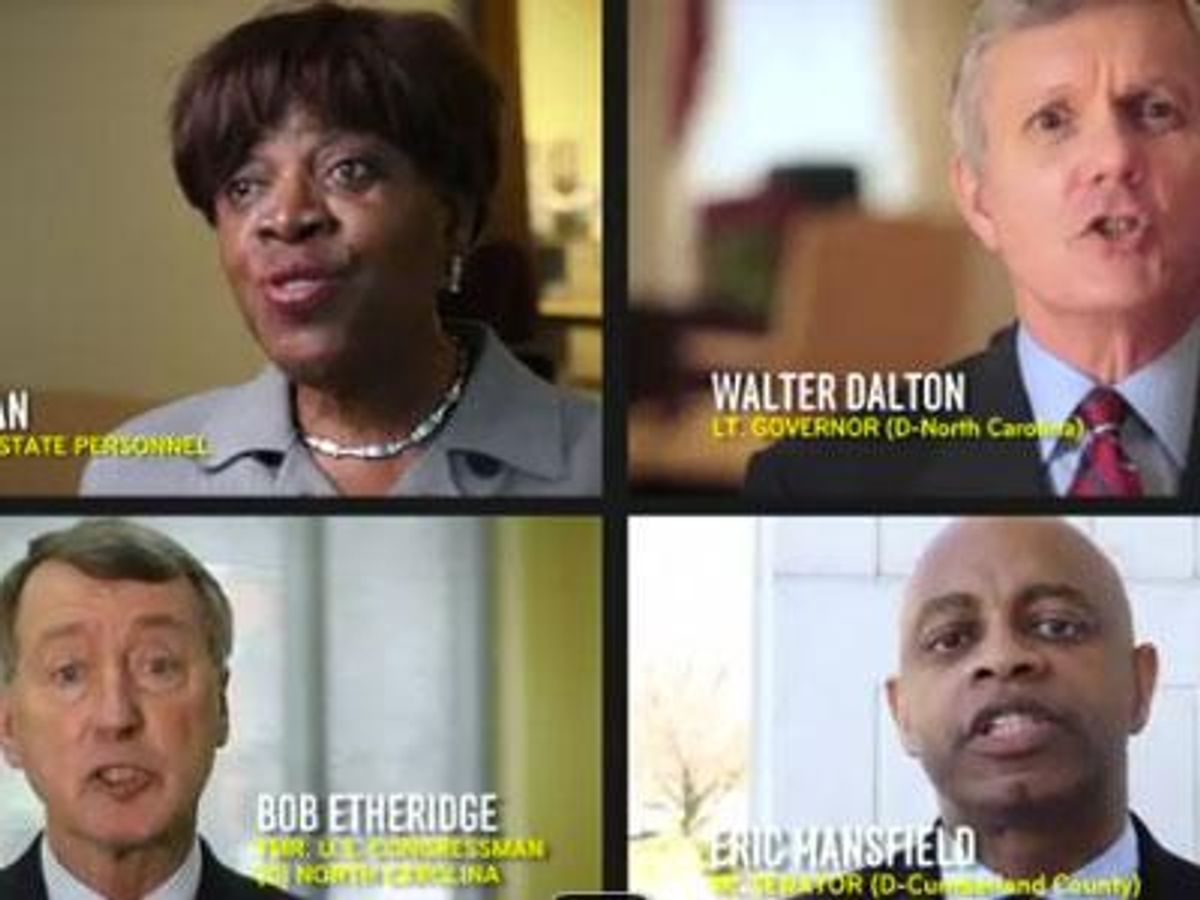Voters will decide Amendment 1 on Tuesday, in a vote that determines whether North Carolina will remain the only southern state without a constitutional ban on same-sex marriage. The measure proposes to make marriage between a man and woman the only legally recognized domestic union in the state. Opponents say the vague, broad wording of the proposal would ban civil unions, while denying health insurance for the children of domestic partners and endangering domestic violence survivors who are not married to their abusers.
Protect NC Families, the coalition working to defeat the amendment, unveiled a three-minute "closing argument" video Sunday night that summarizes their campaign, which has been based on arguments about the "unintended consequences" of the amendment's far-reaching design. The new video highlights the "unprecedented" bipartisan group of elected officials and diverse array of clergy members who oppose the Amendment 1. Legal experts and business leaders from North Carolina-based corporations, including Bank of America and Duke Energy, have also denounced the proposal.
"I think it just speaks to a new time in our movement," said campaign manager Jeremy Kennedy in a conference call with media. He said that the NAACP has made a $500,000 ad buy, sent mail, and helped generate get-out-the-vote efforts. "Come the end of Election Day, whether we win or lose, what's going to be left behind here in the state is going to be lasting."
A Public Policy Polling survey released last week showed that 55% of respondents favor the amendment and 41% oppose it. However, when respondents were informed about the broad reach of the amendment, only 38% supported it, compared to 46% opposed.
"I think that we really have the chance for an upset on Tuesday night, quite honestly," said Kennedy. He said that he saw "a lot of similarities" between Amendment 1 and the "personhood" amendment that failed in Mississippi in November despite appearing likely to pass. "I really think things could go either way as we go into election night," he said.
In addition to the closing video, former Charlotte mayor Harvey Gantt and Erksine Bowles, co-chairman of President Obama's bipartisan fiscal commission, have recorded robocalls. The Democrats' voices will reach voters across North Carolina in the final 48 hours of the campaign. Bowles served as chief of staff for President Bill Clinton, who also recorded a robocall that reached 500,000 voters in the state on Sunday, according to the coalition.
Nation Hahn, director of online engagement for the coalition, reported "stellar" fund-raising over the weekend. The coalition has raised over $2.5 million from more than 11,000 donors, 70% of whom hail from North Carolina. Some $910,000 has been raised online from 7,000 donors.
Vote For Marriage NC, the coalition working to pass the amendment, has raised around $1.4 million. Most of their total comes from organizations, compared to the large number of individuals that have donated to Protect NC Families.
Field director Chris Macneil said that 507,000 people have voted early this year, the highest number in North Carolina history. Some 486,000 people voted early in 2008. Compared to four years ago, when 40% of the early-voting population was African-American, likely driven by Barack Obama's historic presidential campaign, only 16% of the early-voting population this year is African-American. Some 46% of this year's early voters are Democrats, 34% are Republicans, and 20% are unaffiliated. The coalition sees its "biggest opportunity" with the latter group, which includes "students, young people and Ron Paul Republicans."
According to Macneil, the higher-than-expected turnout of unlikely primary voters could work in favor of the campaign to defeat Amendment 1. He said that some 56% of early votes have come from people who have never voted in a primary election or only voted in one primary in the last four years. Polling on the amendment, which predicts the measure will pass, has focused on more reliable voters.
"The question is whether we're doing good enough [with the unlikely primary voters] to make up for the fact that we're a little bit down [with the more likely primary voters]," he said.













































































